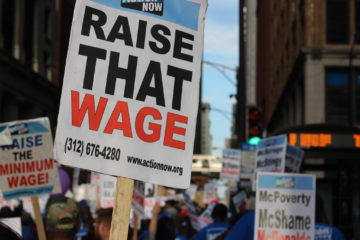 Brian Callaci in The Boston Review:
Brian Callaci in The Boston Review:
A little less than a decade ago, after spending several years as a union staffer helping workers organize in low-wage industries, I was assigned to conduct research in support of fast food workers on strike for a $15 minimum wage and a union. It was exciting; workers were making bold demands on some of the most powerful corporations in the country, including a wage increase to double the current level of the Federal minimum wage. Too bold, in fact, for many. Democratic policymakers balked at $15. And with rare exceptions, the entire academic economics profession was opposed. Economists argued that if we forced employers to pay higher wages, they would simply hire fewer workers. A famous liberal economist even wrote a New York Times op-ed opposing $15. However, the Fight for $15 largely sidestepped the debates, so important to economists, about whether higher minimum wages would result in zero or nonzero job loss. Instead, it articulated a social vision of worker rights: workers had the right to the dignity of a living wage—their living in poverty was intolerable in a rich society.
Then a funny thing happened. Ignoring the experts, cities started passing $15 hourly minimum wage ordinances, and the economic sky didn’t fall. Unemployment didn’t skyrocket, or even rise perceptibly. The economists were wrong. Intellectually honest if initially mistaken, economists looked for theories that would better reflect reality, and a previously out-of-fashion theory known as “monopsony” became the new reigning conventional wisdom.
More here.
